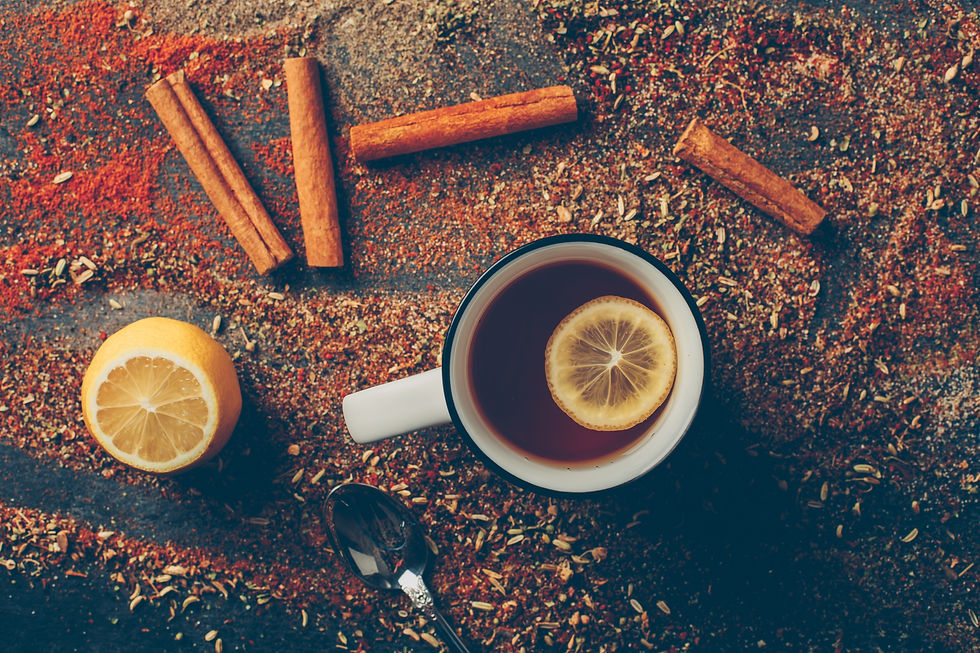5 Ayurvedic Teas to Balance Your Dosha
- Mujahid Khan
- Aug 6, 2025
- 3 min read

What Are Doshas in Ayurveda?
Understanding Vata, Pitta, and Kapha
In Ayurveda, doshas are biological energies found throughout the human body and mind. Each person has a unique combination of these three doshas:
Vata: Composed of air and space; governs movement and communication.
Pitta: Made of fire and water; controls digestion, metabolism, and energy.
Kapha: Made of earth and water; responsible for stability, structure, and lubrication.
When your doshas are imbalanced, it can lead to physical and emotional discomfort. Ayurvedic teas aim to correct this imbalance gently and naturally.
1. Ginger-Tulsi Tea for Vata Balance
Why It Works
Vata dosha tends to be cold, dry, and airy. A warming tea like Ginger-Tulsi helps to ground and soothe this constitution.
Ingredients
Fresh ginger slices
Tulsi (Holy Basil) leaves
Honey (optional)
Benefits
Warms the body
Boosts immunity
Calms the nervous system
2. Fennel-Coriander-Cumin Tea for Pitta Balance
Why It Works
Those with a dominant Pitta dosha often suffer from heat-related issues like acidity and irritability. This cooling blend helps pacify excess fire.
Ingredients
1 tsp fennel seeds
1 tsp coriander seeds
1 tsp cumin seeds
Benefits
Aids digestion
Reduces internal heat
Detoxifies the liver
3. Cinnamon-Licorice Tea for Kapha Balance
Why It Works
Kapha types benefit from light, spicy, and invigorating teas. Cinnamon and licorice stimulate sluggish metabolism and reduce mucous.
Ingredients
1 cinnamon stick
1 tsp licorice root
Cloves (optional)
Benefits
Enhances circulation
Cuts down heaviness
Acts as a natural decongestant
4. Chamomile-Rose Tea for Tridoshic Balance
A Gentle Blend for All Doshas
If you're unsure of your dosha or want something universally balancing, opt for Chamomile-Rose tea. It's calming, aromatic, and perfect for daily wellness.
Benefits
Reduces stress and anxiety
Aids sleep
Supports emotional well-being
This versatile option is a great addition to your herbal tea collection and can be enjoyed anytime without side effects.
5. Masala Chai for Grounding and Invigoration
Spice It Right!
While Masala Chai is often seen as a comfort drink, it’s also rooted in Ayurvedic tradition. A well-balanced cup of Best Chai includes spices like cardamom, black pepper, ginger, and cloves—all of which contribute to balancing Kapha and Vata doshas.
Benefits
Stimulates digestion
Enhances alertness
Uplifts mood
For those seeking a robust and grounding beverage, Masala Chai can be both a daily delight and a dosha-balancing ritual.
How to Choose the Right Ayurvedic Tea for You
Identify Your Dominant Dosha
Understanding your primary dosha is the first step. You can consult an Ayurvedic practitioner or take a reliable dosha quiz online.
Consider the Season and Your Current Imbalance
Sometimes the weather or lifestyle may temporarily disturb your dosha. For instance:
Winter may aggravate Vata
Summer can increase Pitta
Monsoon season tends to disturb Kapha
Choose your tea accordingly.
How to Brew Ayurvedic Teas
Brewing Tips
Use fresh herbs and spices whenever possible.
Boil ingredients for at least 5–10 minutes to extract their full essence.
Strain and sip slowly, preferably warm.
Storage & Frequency
Ayurvedic teas can be made fresh or in batches and stored for a day or two in the refrigerator. Drink 1–2 cups daily depending on your needs.
Final Thoughts: Sip Your Way to Balance
Ayurvedic teas are more than just warm beverages; they’re a daily invitation to restore balance, calm the mind, and nourish the body. Whether you're drawn to the invigorating spices of Masala Chai or the soothing notes of rose and chamomile, there’s a tea for every dosha and mood.
So, steep your herbs, inhale deeply, and let Ayurveda work its quiet magic—one sip at a time.







Comments